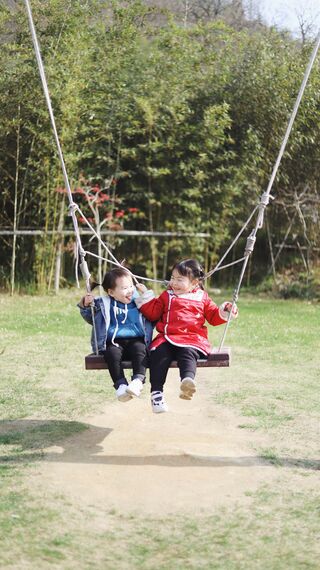Sex
The Kids Already Know
Protecting children from dangerous ideas about sexuality and relationships.
Posted June 7, 2022 Reviewed by Vanessa Lancaster
Key points
- Children and adolescents know much more about niche sexual and relational practices than parents often expect.
- We cannot rely on educators to equip children with the knowledge they need to make safe sexual/relational choices.
- Parents and caregivers increase their children's safety regarding sexuality and relationships by staying engaged and asking questions.
A few weeks ago, I was volunteering at a local high school. One student asked me over lunch what kind of therapist I was and, when I told them I specialized in sex and relationship therapy, nodded knowingly. “I experimented a bit with polyamory back in eighth grade,” they told me, “but it’s not my thing. I’m definitely more mono.” I have to admit, I was a bit taken aback.
Not because I’m averse to ethical non-monogamy (ENM). Many of my clients have relationships that fall somewhere on the ENM spectrum. I was taken aback to hear someone just a year past their bar/bat mitzvah speaking so casually about a rather complex, very nuanced relationship model. I could feel myself shift from semi-cool, non-parental adult into social worker mode.
We talked about brain development and how the pre-frontal cortex, which controls problem-solving, impulsivity, and anticipating outcomes (among other skills), is the very last part of the brain to finishing growing- well after high school is passed.1 The student looked quite thoughtful, then said, “maybe high school isn’t a good time to sleep around.” I agreed that this observation seemed wise. The lunch bell rang.

There’s been a lot of conversation recently about what information is appropriate to share with young people today. From Florida’s ban on any discussion of LGBTQI+ identities (or even existence), which 15 states now seek to emulate,2 to the persistence of abstinence-only education, which seeks to protect children from information about masturbation,3 sexual pleasure,4 consent,5 and contraception6–lest they act on their new-found knowledge.
Not only are young people protected from information about these topics, but only 22 states also require that the content they do receive be medically accurate.7
The tricky thing here is that the kids already know. In a recent college lecture I gave, more than a handful of students commented about practicing “a little casual choking” during sex. As we’ve already discussed, middle schoolers are not only aware of what polyamory is. They’re experimenting with multiple relationships.
Their moms have read 50 Shades of Grey, and their sisters listen to WAP. They know more than any sex education curriculum could ever provide! The problem is, they’re NOT getting the basic facts they need to make these choices safely. Adults put children at risk when we attempt to protect them from themselves.
Several months ago on Twitter, I shocked my followers by sharing the fact that many adult BDSM practitioners report recognizing feelings that they would later come to understand as “kinky” at or before age ten.8 A small hurricane of outrage ensued–along with the requisite accusations that acknowledging this fact was akin to sexualizing children.
That was (and remains) not my intention. I was speaking about adults looking back and assessing their own childhood memories. And yet, it allowed me to offer some suggestions for how to protect children from the dangers of missing and misinformation:

- Normalize conversations about the body and sensory experiences. You don’t need to label “tickles in the tummy” as arousal. But validating a statement of “that makes my tummy feel funny!” and asking if the sensation is enjoyable or not can go a long way towards teaching kids to recognize and respect their body’s cues.
- In addition to not labeling responses, don’t make judgmental or teasing statements about bodies. Let go of notions that school children need “bikini bodies.” Honestly? Unless someone is bleeding, there’s rarely a need to offer commentary on someone else’s body.
- Ask open-ended questions about their relationships, play, and reactions. Stop using descriptors such as “boy/girlfriend” unless the child uses it first–this is especially true for very young children. Just because your toddler has a friend of the opposite sex doesn’t mean he has a girlfriend. Follow your child’s lead. Use their words to describe their relationships, how they play, and how their bodies react to these experiences.
- Discuss different kinds of touches and how our bodies respond to different sensations in different ways. Tell your children that some touches feel good and that they are allowed to enjoy pleasurable touch–alone, in private. Tell your children that they have the right to say no to any kind of touch from anyone- including you. Their bodies belong to them. Tell them so.
- Don’t assume they're learning the basics in school. And if they are? Don’t assume that the information they’re being given is accurate. Go out of your way to include books about bodies, gender, sexual health, and relationships in your home library–and read them. Don’t keep these topics separate from the fairy tales, truck books, and baby animal stories. Read these titles the way you read any other book so that their content is normalized and the conversations as your child grows are comfortable.
- When these topics come up on TV, in a song, or on social media, don’t turn the channel–have the conversation. Ask your kids what they think the media is talking about. Ask what they already know (or think they know) about the topic. Ask them if they have any questions for you. A placid, non-reactive, and curious demeanor will teach your kids that they can come to you to talk about anything- even the things they already know.
References
[1] https://www.urmc.rochester.edu/encyclopedia/content.aspx?ContentTypeID=…
[2] https://www.npr.org/2022/04/10/1091543359/15-states-dont-say-gay-anti-t…
[3] https://www.christianpost.com/news/mom-outraged-at-plan-to-teach-mastur…
[4] https://www.ncbi.nlm.nih.gov/pmc/articles/PMC6951361/
[5] https://www.guttmacher.org/fact-sheet/adolescents-teens-receipt-sex-edu…
[6] ibid
[7] https://admissionsly.com/sex-education-statistics/
[8] https://twitter.com/Tzefira_Neviah/status/1480561975340027904?s=20&t=lR…


